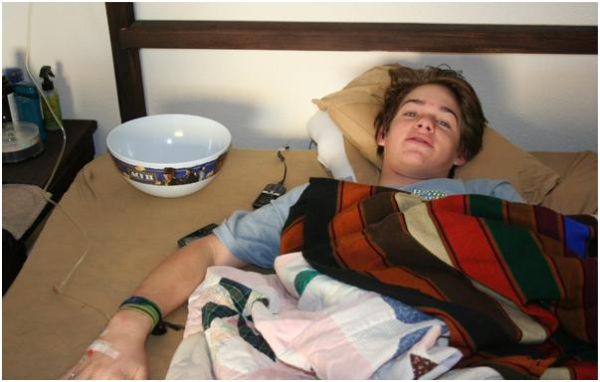Typhoid Fever

Most of the malicious diseases are water borne, because harmful bacteria and viruses thrive well in water even at room temperature. Among the myriad water borne diseases, the one that takes a heavy toll on our health is typhoid. Typhoid is generated from a harmful bacteria known as Salmonella Typhi, which enters our body, if we drink contaminated water. This bacterium is more common where sewage waste contaminates drinking water. Once the bacteria perforate through the intestine wall, it begins to multiply at normal body temperature. At this stage, the person affected gets symptoms such as body ache, fever, appetite loss, lethargy, and frequent headaches.The Salmonella bacterium thrives only in human body and does not affect animals; so there is a chance only for human-to-human transmission of this disease.
Causes
The major cause for typhoid is lack of sanitation. Hence, it is more found in developing countries than in developed countries. If our drinking water or water that we use for cooking has Salmonella bacteria, then it sets the stage for typhoid fever. Salmonella bacteria are most commonly found in human waste and in sewage water. By any chance, if the source of the bacteria mixes with the water that we use to prepare food, then the bacteria enters our body and begins to thrive well at body temperature. After the bacteria penetrate through the small intestine wall into the blood stream, it multiplies on the cells of vital organs such as liver, bone marrow, and spleen, and then invades the lymphatic tissue of the bowel. Finally, the bacteria pass into the large intestine and show its presence in human waste product.
Symptoms
Following are the symptoms of typhoid:
1. Poor appetite
If the appetite reduces followed by weight loss, then it is the onset of the bacteria on the body. Along with this symptom, the person would also notice a coating on tongue, teeth, and lips. Another major symptom that occurs along with this is distended stomach with constipation.
2. Abdominal pain
If there is an abdominal pain and malaise along with poor appetite, then it is an indication of the bacteria attacking the body.
3. Headaches
Sometimes, headache can occur due to constipation. If you experience frequent headaches, then it could be an indication of the onset of the disease.
4. Body ache, fever, and chills
These symptoms indicate the initial stage of the attack. However, these symptoms are quite common for other types of fever too. Therefore, it is better to consult a doctor at this stage.
5. Slowness and lethargy
If you feel too lethargic, then it could a major symptom. At this stage, you should consult a doctor to diagnose whether the lethargy is due to typhoid or general weakness.
6. Delirium, Agitation and Hallucination
These are the three important symptoms of typhoid. If you experience these along with other symptoms, then you should consult a doctor immediately.
7. Sever fatigue
This symptom indicates onset of the disease. It is necessary to consult a doctor at this stage.
Diagnosis
1. The common test to diagnose typhoid is to do a blood test for the presence of high count of white blood cells. As the blood contains the bacteria, a blood culture test can show the presence of bacteria. The culture is prepared by placing the sample on a medium that promotes the growth of bacteria within 48 hrs.
2. Other tests for diagnosing typhoid includes urine test, stool culture test, bone marrow test, and platelet count test.
Treatment
First and foremost, you must consult a physician as soon as you experience any of the initial symptoms mentioned above. An early treatment to typhoid would make things easy in the future. A prompt early treatment can also stop the bacteria from proliferating further.
Generally, doctors prescribe antibiotics for typhoid. However, long-term use of antibiotics can make some bacteria resistant to the treatment. If the bacteria become antibiotic resistant then the chance of relapse is quite high. Other treatments include drinking electrolyte and fluids to rehydrate the body.
Prevention
Prevention is better than cure. All age groups can be affected by typhoid. We can take the following steps to prevent typhoid:
1. Vaccination
Typhoid vaccines can prevent typhoid to an extent. This has been the most effective method followed so far. If you are traveling to a place that has low sanitation standards, then it is essential to have yourself vaccinated with typhoid vaccines.
2. Clean water
The best way to prevent typhoid is to make sure that you always drink clean and pure water. It is also essential to make sure that the packaged water you buy has necessary quality standards. Apart from this, it is essential to eat well-cooked foods, as raw foods can contain bacteria.
3. Water Treatment
Having a proper water treatment is a mandatory basic measure to prevent typhoid. A proper waste disposal and protecting the foods from contamination should be followed stringently to avoid being infected with deadly bacteria and viruses.




